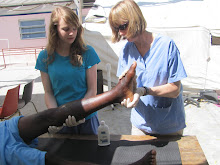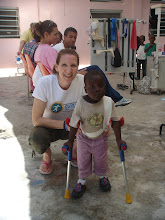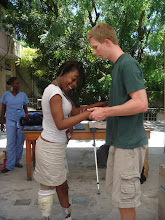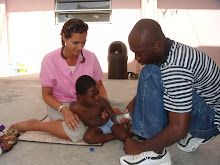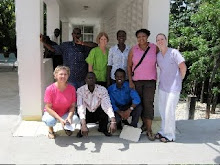Haiti Cherie: Graduate Student Spotlight Essay & Video detailing the Experience
Haiti Cherie
They say, “Be the change you want to see in the world,” but where do
you start? Last month I read a research article that discussed
service-learning experiences in third world countries for occupational
therapists. I immediately began researching opportunities on the
internet, thinking to myself, ‘how can I make this happen’? I sent a few
emails to the president of a non-profit rehabilitation clinic in Haiti
and with an unrelenting
aching desire to create more meaning in my life and make a difference
in the lives of those that could give me nothing in return, I took a
leap of faith. Here is the story of my solo journey to Haiti.
Pòtay, Fatra, Debri, Povrete
(Gates, Garbage, Rubble, Poverty)
These were my first observations as we drove through streets ridden
with potholes and without signs, speed limits, or stoplights. The
devastation from the 2010 Earthquake is still visibly apparent and the
poverty is rampant. I see children with extended bellies, hundreds of
people selling food on street corners, and starving dogs pulling apart
the trash that fills each street. I arrive at the Clinic, a large tent
with cloth tarps lining the wet and uneven terrain. There is one table
to see patients, a mat to treat children, a desk, and a few supplies in
the corner on plastic shelves. Here I meet the Haitian men (Andre and
Frantzo) who run the clinic, as volunteer therapists from all over the
world come and go.
My
first day at the clinic I was told that everyone will show up right
when we open. Service is first-come first-serve and trying to initiate
appointment times has proved futile in a culture that does not view time
the same as most Western countries. Andre the clinic manager and
interpreter, begins by taking each patient’s blood pressure. This is
crucial in Haiti due to the prevalence of hypertension and high risk for
stroke. With only 10% of the country having running water and 50%
having access to limited amounts of clean water as well as their
excessive use of salt in their foods, their culture increases their risk
factors. I would learn over the next two weeks that the majority of
the patients at the clinic were stroke survivors who wanted therapy to
increase their independence.
I
would greet my patients “Bonjou, vini tanpri, kijan ou ye?” then
explain the treatment we would be doing and talk with them in Creole as
we worked. Occasionally I would yell to Andre (who was often working
with another patient) “Kijan ou di...safety” when I needed the
translation of a word. An hour and a half would pass and it felt like
twenty minutes. I was in my element.
Aside
from the stroke patients, there were a few young children that came to
the clinic for therapy also. I would find toys from the sparse supplies
to provide a rich and stimulating environment to engage their happy
hearts. We worked on increasing their abilities and before I knew it,
two hours would pass. Frantzo would say, “Okay, Amy, time for the next
patient please.” The family would thank me and wait for their ride.
Often using the most common form of transportation in Haiti, the
motor-bike taxis. One family would regularly sandwich the child between
the driver and the woman and ride off without helmets to their
destination. I would wave goodbye in awe, as I envisioned all that
could go wrong in that situation.
After
all the patients had been treated for the day, I would head back to the
home where I stayed for the two weeks. There I would find a
traditional Haitian dinner prepared for me. Often I went upstairs and
talked with the Haitian host family I stayed with. We’d share stories
about our days and lives while sipping guava juice (some nights mixing
it with Haitian Rhum) and laughing all the while! Then, I’d take a cold
shower, write in my journal, do homework by headlamp and read under the
mosquito net before falling asleep.
On
the weekends I was able to see many different parts of Haiti. I went
to two church services at a local nursing home that were entirely in
French. Where a limber 90 year old man asked me “Etes-vous tombe du
ciel?” -Have you fallen from the sky? I also attended an annual
community art festival that had booths set up for Haitian artists to
display their crafts. I bought a couple necklaces that were made of
recycled materials by Haitian women working to support their families.
Each woman’s story was attached and I was deeply moved by them. This
initiative empowers women as entrepreneurs and I will be selling their
jewelry for them here in the states over the next few months.
I
continued to explore the festival with Caroline, the head of the family
I stayed with. Caroline is the owner and director of a private Pre-K
through 9th grade school. I had read that most educated individuals
leave Haiti after obtaining their education. I asked Caroline why she
stayed, to which she replied, “Here I am a leader, in America, I would
just be a number.” She is extremely intelligent, a wonderful host and a
true inspiration.
Caroline’s
kind and witty husband Henri was also a great host. On my last weekend
in Haiti, we toured the only neurotrauma hospital in the country. Here
I met with one of the three neurosurgeons in the country and also with
Matt, a physical therapist that manages a program at the hospital called
“Project Stitch.” This project teaches spinal cord patients and
amputees how to sew to
make a living for their families, while also trying to dispel the
outdated and oppressing notions of disability. On the tour, we walked
into the four bed E.R. to see doctors working hard to stop the bleeding
of a woman that was missing half of her face from a motor-taxi accident,
with pools of blood and rags all around, there were no curtains
separating her from the other patients. The tour continued where we saw
the only adult ICU in the country, which had five beds, the only CT
scanner and the only acute spinal cord injury ward in the country, which
had eight beds. Seeing the progress Matt has made was refreshing, but
the disparities in access and quality of healthcare as compared to the
states is undeniably unjust.
Reflection
The
thing about Haiti is, even though these people didn’t have money or
things to give me in return, what they gave me was worth far greater. A
people that have known violence, devastation, lack of justice, and
extreme poverty, gave me their smiles, their gratitude, their hard work,
sweat and faith, and have further propelled my passion for occupational
therapy and social justice. The major similarity between occupational
therapy and the development of third world countries is that you must
empower people to help themselves, you cannot do the work for them.
Traditional charity fails these countries and that is why we must
invest in the people, so that they can help themselves.
With
treatment focused on the client and the creativity allowed to help
empower each patient reach any goal they find personally meaningful; I
instinctively knew that a career in occupational therapy was the right
path for me. Haiti has taught me that I can use my skills to help
others feel successful as they pursue goals and opportunities that they
might not have believed they could achieve prior to therapy. I have
learned the importance of recognizing and celebrating the little
victories with each client and that through occupational therapy and
regardless of cultural differences, I am able to instill hope where
disability or illness may have depleted it.
This has been the most rewarding experience I have ever been blessed with. I
have learned so much about myself as well as having gained greater
insight into my therapeutic style. I have a new enlightened perspective
on what it means to be brave, by watching all these resilient
individuals push through the circumstances they have been dealt, as they
strive for a better tomorrow. Each day was an opportunity to learn and
I tried to be open to and absorb as much of the culture and life
lessons as I could. This experience has helped me realize that the
burdens in my life back in the states are rather trivial as compared to
the daily struggle people face elsewhere in the world. This new
perspective and the cultural competency I gained is not something that
can be learned in a book.
I
have been altered at my core, truly inspired, and deeply empowered to
help others on a global scale. I give my endless gratitude to the
patients at the clinic and my Haitian family. As well as a big thank
you to my family in the states for their support and love on my journey!
We show the world who we are through our actions and not merely our
words. I encourage everyone to take a leap of faith and see where it
takes them, because“
You gain strength, courage, and confidence by every experience in which
you really stop to look fear in the face. You must do the thing which
you think you cannot do.” -Eleanor Roosevelt









